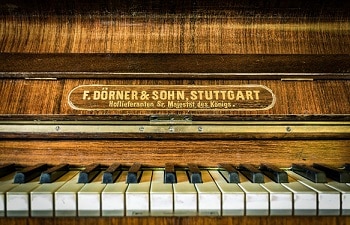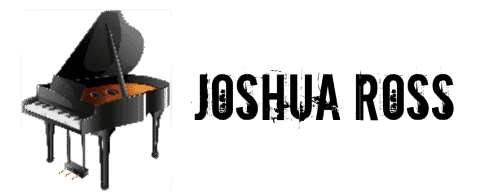As an Amazon Associate I earn from qualifying purchases.
Owning a piano is one of the greatest joys, especially for a serious player. Knowing how to store a piano is crucial if you want it to last for a long time. A common question pianists have is why do pianos have to be placed on an inside wall.
So, why does a piano have to be on an inside wall? An inside wall helps protect the piano from direct sunlight and sudden changes in temperature. Pianos can be placed near outside walls as long as it is away from open windows and doorways. A piano should not be near air vents, fireplaces, areas where high temperatures can affect it.
Want to Learn Piano?Click Here

Why You Should Never Put A Piano On An Outside Wall
Placement of the piano is actually a really big deal; especially if you plan to keep it in great shape for years to come. You wouldn’t just want to put your piano anywhere in the home, because all the walls aren’t created equal in this case!
So why does a piano have to be on an inside wall? Is there some sort of special reasoning behind it? Well, actually there is.
If you know anything about musical instruments they are extremely delicate. Whether it’s a clarinet, trumpet, or even a piano it has to be in a certain sort of climate to stay in great shape. In the case of pianos you generally want to keep them at a safe humidity level.
Having them along an outside wall leads to some serious negative side effects. This is where the home will be it’s warmest because it’s the closest to the sun.
What Are The Side Effects Of Placing A Piano On An Outside Wall?
What ends up happening is your piano can experience severe tuning loss, swelling and a host of other mechanical failures if it isn’t in the right climate. Also if it’s in direct contact with the sun the finish of the instrument can be ruined. Let’s take a look at those side effects below.
- Loss of tuning
- Swelling of the wood
- Ruining of the finish (sometimes cracking!)
- Mechanical failures
- More money out of your pockets for repairs and tuning costs!
I would like to note that newer homes built in the last 10 to 15 years don’t have as much of a problem with placing pianos on outside walls. The insulation is better, the windows are generally thicker and more durable so the temperature shifts aren’t as impactful as they once were.
Where To Put A Piano In The Home?
Ideally, you should place your piano on an inside wall. That’s not enough on its own though. If that location is near a vent then when you change the temperatures the piano could be directly impacted.
Make sure the room doesn’t have vents in the floor either because that can cause a significant climate change for the piano when your system shuts on and off throughout the day.
Try not to place your piano by any sort of exterior doors either. This will typically be the main entrances to the home like the front door, side door and patios.
Since those are high traffic areas of the home anytime you open it a rush of cold or hot temperatures will come into the home and have an almost immediate impact on your instrument. At most though your piano will just lose it’s tuning relatively faster than it should.
Is It Okay To Put My Piano By A Window?
The answer to this is simple; maybe. If the window is in a location of the home where sunlight cannot travel through then you’ll be fine. However, if it’s in an area of the home where it’ll get a good daily dose of sunshine then you should really brainstorm another location for your piano.
Now if you have a climate controlled system installed on the piano that helps, but it’s not going to be enough during those extremely hot days.
If a window is the only space you have available then you should invest in a set of blinds that can keep the sun out. Medical blankets or reflective tint film is also a great idea to bounce the sun off that area of the window too so that the area remains cool.
What Humidity Should A Piano Be Kept At
So is there an ideal humidity level that your piano should be at? In short, yes! You want the relative humidity of the piano to be somewhere between 45% to 70% according to Steinway.
Humidity has a great effect on how your piano performs, the action and the maintaining of the wood. The soundboard is also impacted by the humidity levels; the most important part of the instrument.
When the humidity is not well regulated you risk moisture forming over the soundboard. This moisture causes the parts to expand and in turn begins to negatively change the strings, the tuning pitch and more in a chain reaction.
If it’s a situation where the humidity is too low then you’ll experience the opposite effect; shrinking of the soundboard. This is what you associate with a pitch drop rather than a pitch raise. Here’s how to tell if your piano is out of tune.
What’s interesting here though is that when the humidity rises back to the proper level so will the pitch. It’ll never be exactly where it was of course, and won’t be too noticeable.
How To Regulate Piano Humidity
The best way to regulate the humidity of your piano is to either buy a digital humidifier or get a built-in humidity component. Digital humidifiers will measure the moisture in the air and make the adjustments for you automatically most of the time.
Humidity control devices that you install underneath the piano are also great remedies too. They’re quite expensive, but they contain everything you need to keep your instrument regulated.
Typically they’ll have a humidifier, dehumidifier, and a sensor to measure the relative humidity and make automatic adjustments.
The other quick fix if you don’t want to drop a ton of money on a humidity control device is to use. This goes back to the placement of the piano in the home! Keeping your piano away from outside walls, kitchen areas with stoves and vents is a natural way to fix the problem.
I personally like placing my piano into a back room that’s not close to the window. It’s in the middle of the floor too rather than right up against the wall so that helps keep the tune much longer.
Should I Get A Piano Cover?
If you have the money to invest in a good quality piano cover than you absolutely should. I especially recommend this option for those who have small homes and can’t really place their pianos anywhere else but the outside wall. A piano cover will help protect the finish, and most of them are really thick so the heat won’t travel through even through direct sunlight.
Final Thoughts
So as you can see the question of where you should place a piano is much bigger than the cosmetics. Placement can have a direct impact on how your instrument performs, and it’s longevity too. Not only that, but the placement has a great impact on the sound quality too.
If you were to face a piano the wrong way, especially a grand piano then you as a pianist would be missing out big time. The sound should travel throughout the room, and placing it on an inside wall with the straight edge facing that way gives you the best results.
First I would invest in a good piano cover, and try to get the piano in an area where it won’t be impacted by temperatures. I would also go ahead and purchase a humidifier device if you can swing the price tag. If not it’s okay.
For those with a small home, I would also consider grabbing some UV blocking drapes or window tint covers to cut down on the impact of direct sunlight. Experiment with these suggestions and I think you’ll see a big turnaround in how your instrument performs heading forward!
Hello & thanks for stopping by! I’m a professional concert pianist and piano instructor. In the United States, I’ve given successful performances in several places including New York, Florida, Connecticut, & New Jersey, I have also performed internationally in Italy and made my Carnegie Hall debut in 2014. I enjoy blogging about the piano, the art of performance, general music, current events and the latest in music production.

Do Pianos Need Humidifiers - Joshua Ross
Friday 1st of February 2019
[…] The wood itself can actually crack, especially in the thinner places such as the soundboard. This can lead to expensive repair costs. This is why it’s never a good idea to put a piano on an inside wall or near a window. […]
How To Store A Piano - Joshua Ross
Saturday 12th of January 2019
[…] piano in another room of the home, it’s best to keep it away from outside walls and windows. Storing a piano on an inside wall helps protect it from direct sunlight and helps preserve the tuning and regulation of the instrument. It’s […]
How To Tell If A Piano Is Out Of Tune - Joshua Ross
Wednesday 9th of January 2019
[…] Keeping your piano in this state not only helps with tuning, but it also helps to prevent the wood from swelling. If you have a piano next to a window then it may experience sudden fluctuations in temperature, especially during the hottest time of the day. This is why it’s always a good idea to place a piano on an inside wall. […]
How To Buy A Used Piano - 11 Steps To Follow - Joshua Ross
Thursday 4th of October 2018
[…] things around to get an idea of how a piano would work in your residence. Also, make sure you can place your future piano on an inside wall if […]